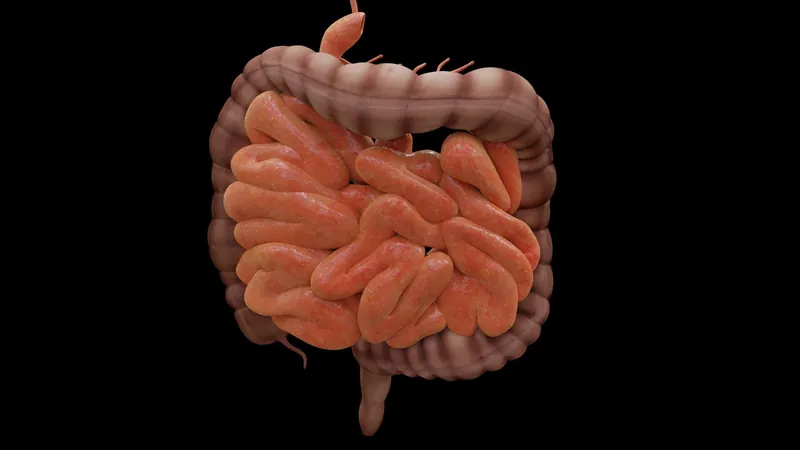
Experts Urge Earlier Screening Age for Colorectal Cancer as Rates Surge Among Young Adults
2025-03-27
Author: Olivia
Colorectal Cancer Trends
Colorectal cancer, once thought to be a disease primarily affecting older adults, is now increasingly diagnosed in individuals in their 50s, 40s, and even younger. Recent statistics from the American Cancer Society reveal a troubling trend: the incidence of colorectal cancer among those under 50 has climbed approximately 2% annually over the past decade. Alarmingly, in 2019, a staggering 20% of colorectal cancer diagnoses were in individuals aged 54 or younger, a significant jump from just 11% in 1995.
Moreover, a notable shift has been detected in the types of colorectal cancers affecting younger populations. Rectal cancer is now more prevalent than colon cancer among younger patients. Data for 2023 indicates that of the estimated 46,050 new rectal cancer cases, 37% will occur in individuals under 50, contrasting with only 24% of cases in those aged 65 and older.
Experts Advocate for Earlier Screening
In response to this alarming trend, experts are now advocating for routine screening for colorectal cancer to begin at age 45. Dr. Derek Ebner, a gastroenterologist at the Mayo Clinic Comprehensive Cancer Center, stresses the importance of recognizing the symptoms of colon and rectal cancer regardless of age. “When detected early, and if the cancer remains confined, the five-year survival rate is exceptionally high—90% or better. Conversely, if the cancer spreads, the survival rate drops significantly, typically to 15% or less,” explains Dr. Ebner.
Understanding Risk Levels
Colorectal cancer poses a risk to everyone, with individuals typically categorized into two groups: average-risk and high-risk. Those at average risk may not experience any symptoms and lack any known risk factors. In contrast, individuals considered high-risk often have at least one of three key variables: a medical condition, a genetic disposition, or a family history of colorectal cancer.
Conditions increasing cancer risk include: - A personal history of colorectal cancer or polyps - Inflammatory bowel disease - Diabetes - Obesity
Genetic conditions such as familial adenomatous polyposis (FAP) and Lynch syndrome are also significant contributors. FAP is a rare genetic disorder caused by a defect in the adenomatous polyposis coli (APC) gene, with up to 30% of cases occurring due to spontaneous mutations. Lynch syndrome, characterized by inherited cancer risk, heightens susceptibility to various cancers, including colorectal and endometrial cancers.
Family history plays a crucial role in assessing risk levels. If a first-degree relative, such as a parent or sibling, has been diagnosed with colorectal cancer or precancerous polyps, screening should begin earlier and occur more frequently.
Environmental Factors and Lifestyle Changes
While the exact reasons behind the rising colorectal cancer rates in younger individuals remain unclear, Dr. Ebner suspects environmental factors may play a significant role. “Over the past half-century, there have been dramatic shifts in diet characterized by increased consumption of ultra-processed foods and red meats. These dietary changes may have adversely affected gut bacteria, potentially reducing our microbiome's protective capabilities. A sedentary lifestyle and rising obesity rates are also contributing factors,” he says.
To mitigate the risk of colorectal cancer, Dr. Ebner advocates for a shift toward a more plant-based diet coupled with regular physical activity.
Screening: The Key to Prevention
Early screening is vital for identifying polyps that can develop into cancer. Dr. Ebner emphasizes, “By detecting and removing polyps, we can prevent cancer from developing. Unfortunately, once cancer is diagnosed, that preventive opportunity is lost.”
In the United States, colonoscopy remains the most prevalent screening method. During a colonoscopy, a long, flexible tube with a camera is inserted into the rectum to examine the colon for any abnormalities, such as polyps or signs of cancer. Moreover, non-invasive options like the stool DNA test (Cologuard) are available, which analyzes stool samples for DNA indications of colon cancer or hidden blood.
Younger patients may exhibit different symptoms compared to their older counterparts. “While abdominal pain and blood in stool are common symptoms, those diagnosed under age 50 often present more frequently with diarrhea,” Dr. Ebner notes. A recent study supports these observations, indicating that individuals diagnosed with early-onset colorectal cancer often experienced symptoms like blood loss after bowel movements which could lead to iron deficiency anemia.
Importance of Timely Response
Timeliness in addressing symptoms is critical. “These signs can be embarrassing, but it’s crucial to discuss them with a healthcare professional. Delays in seeking help can lead to advanced-stage cancer, which is more difficult to treat,” warns Dr. Ebner.
If you experience any unusual digestive symptoms, don't hesitate to consult with your healthcare provider. Early intervention can significantly impact your health outcomes, making it crucial to prioritize screening and monitoring, especially if you fall within the at-risk age group. Act now—your life may depend on it!









 Brasil (PT)
Brasil (PT)
 Canada (EN)
Canada (EN)
 Chile (ES)
Chile (ES)
 Česko (CS)
Česko (CS)
 대한민국 (KO)
대한민국 (KO)
 España (ES)
España (ES)
 France (FR)
France (FR)
 Hong Kong (EN)
Hong Kong (EN)
 Italia (IT)
Italia (IT)
 日本 (JA)
日本 (JA)
 Magyarország (HU)
Magyarország (HU)
 Norge (NO)
Norge (NO)
 Polska (PL)
Polska (PL)
 Schweiz (DE)
Schweiz (DE)
 Singapore (EN)
Singapore (EN)
 Sverige (SV)
Sverige (SV)
 Suomi (FI)
Suomi (FI)
 Türkiye (TR)
Türkiye (TR)
 الإمارات العربية المتحدة (AR)
الإمارات العربية المتحدة (AR)